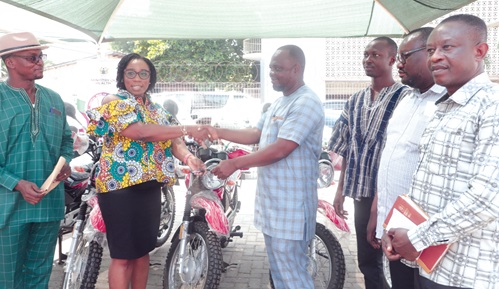The Ghana Health Service (GHS) needs to replace over 4,000 motorbikes in health facilities across the country.
This, managers of the service explained, followed the breakdown of most of their motorbikes, used mostly in sub-urban communities, including hard-to-reach areas.
The Deputy Director, Transport Management of the GHS, Abu Alhassan, who disclosed this in Accra yesterday, therefore, appealed to agencies and other organisations to come to their aid to enable them to augment the fleet of motorbikes used for last mile services by health workers.
He said this when the Mental Health Authority (MHA) donated five new motorbikes to five districts to help mental health staff go into the communities to reach out to mental health patients.
The beneficiary districts are Nkwanta North and South, Tiase Health Centre in the Afram Plains, Krachi East and Krachi Nchumuru.
“The role of motorbikes in health service delivery cannot be underplayed.
They play a key role in healthcare delivery at the lower level - from the districts, sub districts to the communities, motorbikes play a key role.
“When it comes to the hard-to-reach communities where vehicles cannot go, that’s where our people use motorbikes for their home visits, outreach services and the rest,” Mr Alhassan explained.
Target
The GHS Deputy Director, Transport Management, who was speaking on behalf of the beneficiary districts, said most of these motorbikes had a maximum life span of three years and their recent survey showed that many of them were down and required to be replaced, an exercise which had begun.
He said their target was for each health facility to have at least, one motorbike to improve service delivery in the country, pointing out that it was a huge task, given the number of facilities.
He, therefore, commended MHA’s initiative to donate the motorbikes to the districts.
Challenge resolution
Explaining the rationale behind the presentation of the motorbikes, the Deputy Chief Executive Officer of the MHA, Dr Caroline Amissah, said during a visit to some districts in the country, the CEO of the MHA realised that some of the districts had a challenge with transportation; as a result, on her return, the MHA garnered resources to support some of those districts.
She explained that some of the clients they encountered, especially in their facilities, were from remote areas where their staff, as part of their work, did follow-ups to their homes to counsel and do refills for them when their medications ran out.
Dr Amissah expressed the hope that the presentation would serve as a catalyst to others to come to the aid of the authority so that they could help promote mental health service in the country.

